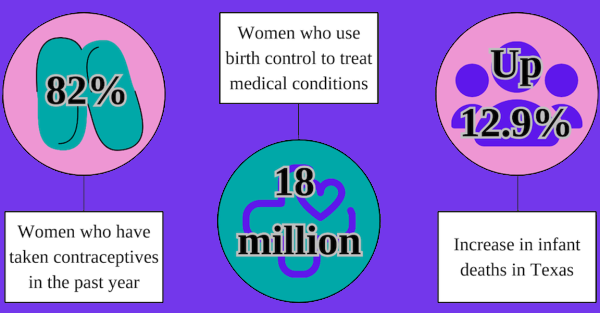Many teens and adults use different forms of contraceptives for various reasons. According to the Cleveland Clinic, some use them to prevent unwanted pregnancies, while others use some forms, such as birth control, to regulate certain health conditions. Although there is no explicit law in Project 2025 that would institute a total national ban on all contraceptives, there are still statewide trigger laws that will go into effect if the Supreme Court chooses to overrule landmark cases for reproductive rights like Griswold v. Connecticut. The government should not be allowed to limit access to contraceptives because doing so denies citizens of their rights, deprives people with health conditions of the medical care they need and will cause an increase in the infant and maternal mortality rate.
According to Oyez, Griswold v. Connecticut was a court case that ruled in 1965 that married couples had the right to purchase and use contraceptives. This decision paved the way for reproductive rights across the nation. According to NBC, Republican Supreme Court justice Clarence Thomas is calling for the courts to review this case among many other landmark civil rights cases after the overturning of Roe v. Wade.
Additionally, Sen. Josh Hawley, R-Mo., has introduced a bill for the defunding of Planned Parenthood. Because the judicial court has already chosen to overturn Roe v. Wade, it can be expected that they will also approve defunding these vital sexual education programs. Without federal funding for Planned Parenthood, it will be a lot harder for women to access contraceptives, especially in more conservative states, such as Texas. Sen. Elizabeth Warren, D-Mass., told NBC, “We saw what the Supreme Court did on abortion, and now there’s a real risk they may do the same thing on contraception.” This defunding would make many states that have a majority of Republicans more likely to ban contraceptives outright, which would endanger those who need reproductive medications.
While the government should be allowed to change and ratify laws in general, this change is shortsighted and injurious. According to a Kaiser Family Foundation survey, more than eight of every 10 women (82%) in the U.S. have taken birth control in the past 12 months. By sheer numbers alone, a government ban would deny more than three quarters of American woman access to necessary medication. In his concurring opinion to the court decision that overturned Roe v. Wade, Thomas wrote that having a law protecting reproductive rights represents a “legal fiction” that is “particularly dangerous”; however, the real danger is depriving every woman of their constitutional right to treat their bodies the way they want to.
Furthermore, depriving anybody of reproductive age to choose whether they would like to have a baby is simply wrong. The age at which someone who is biologically female begins to menstruate continues to drop at a sharp rate. According to a 2020 report by the U.S. Department of Health and Human Service, a majority of women now receive their first period at age 12. Just because someone is of “reproductive age” does not mean they are mentally or financially ready to have a baby. Before judges review the Griswold case, they should consider the effect overturning the decision could have on preteens and teens.
Some officials believe that women should not have access to reproductive medicines because they believe many women don’t understand the consequences of engaging in sex. This view ignores the truth that not everyone who uses contraceptives, specifically birth control, is using them in order to prevent pregnancy. According to the Cleveland Clinic, birth control can be used to treat medical conditions such as polycystic ovarian syndrome and endometriosis and can lower the risk of different cancers. Denying access to these medicines therefore could have fatal consequences to individual mothers and to the population as a whole.
Birth control, moreover, can serve as a great, cheap and reliable solution to countless medical issues. The Kaiser Family Foundation reports that 14 percent of all birth control users, around 18 million women in the United States, use birth control to treat reproductive conditions and diseases. Restricting access to millions of users from oral contraceptives would be a big mistake, and would worsen the reproductive health of many women. Lawmakers that support that ban say they do so to protect unborn babies, but the ban actually would put them more at risk by making women carry unsafe pregnancies.
We’ve already seen the death toll go up for mothers, and it will only continue to go up if lawmakers decide to put in place bans on contraceptives. In Texas, for example, one of the states most at risk for a contraception ban, there has been an increase to 32.9 deaths per 100,000 live births in the maternal mortality rate since the abortion ban, according to a National Center for Health Statistics study conducted by Dr. Donna L. Hoyert. The previous years’ reported a much lower mortality rate: 20.1 deaths per 100,000 live births in 2019 to 23.8 in 2020. The increase in mortality rate is significant. If contraception gets banned, the death toll will only increase at an even more alarming rate once millions of women are unable to choose contraception.
Additionally, the mortality rate for infants has increased drastically since the abortion ban. According to a study published in JAMA Pediatrics, there was a “12.9 percent increase in infant deaths in Texas versus a 1.8 percent increase in infant deaths in the rest of the U.S. during the same period.” Instead of saving lives, lawmakers are putting them at risk. If the ban on contraception is put into place, there will be an even more alarming increase in this rate and in the maternal mortality rate.
Banning all contraceptives would cause extremely detrimental health effects to all users and the whole general population. With the ban on abortion already having been put into place in Texas, it is vital that there is still access to contraceptives for the safety and quality of life in the U.S. Lawmakers should consider the well-being of everyone in the nation before inserting their opinions into the constitution. Without this consideration, reproductive rights will move backward even more so than they already have and harm all citizens in the country.








